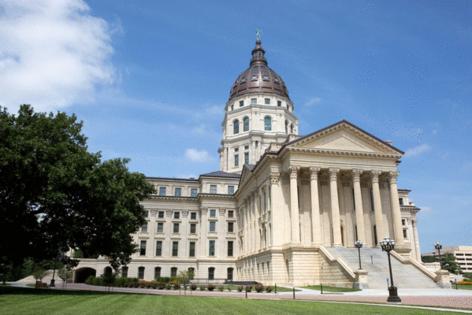What new laws start in 2025 in Kansas? No more food tax, lawmaker raises & more
Published in News & Features
Changes to tax policy, driving privileges and lawmakers’ salaries are among those that will go into effect Jan. 1, 2025.
Some of the 111 bills passed by the Kansas Legislature in 2024 will become law on New Year’s Day along with a number of provisions approved in previous years.
One such item is the removal of the state sales tax on grocery items. The bipartisan legislation, a focal point of Democratic Gov. Laura Kelly’s re-election bid, was signed into law in 2022. The tax has been gradually reduced from 6.5% to 2% before its removal.
“The complete elimination of the state sales tax on food is a win for Kansas. By axing the food tax once and for all, the average family of four will save $500 per year on groceries,” Kelly said in an email statement.
Unfortunately for consumers, local city and county sales tax on groceries still apply.
Starting on Jan. 1, Kansas retailers can legally add a surcharge fee to credit card transactions. A federal court ruled the previous state law banning merchants from passing surcharges onto customers unconstitutional in 2021.
“That surcharge is an actual expense that’s being charged to the merchant (by credit card companies), so what’s happened in the past is the merchant absorbs the cost and nobody ever knows it . . . Now that charge can be passed on,” said Sen. Michael Fagg, an El Dorado Republican.
The new law requires merchants to post notice of any additional fees at the door or the point of sale.
Reforms and raises
The new year will also bring an overhaul of state law for dealing with unpaid traffic fines, expanding access to a restricted license for drivers who can’t immediately afford to pay tickets in full.
Under existing law, people who can’t afford to pay misdemeanor traffic fines in 30 days have their license suspended. If they are subsequently caught driving, their license will be revoked. The new law allows people to petition the court to reduce or waive their fees and caps the cost of reinstating a restricted license at $100 to limit debt.
“It’s going to help so many people. It’s just unbelievable the people that I’ve talked to over the years who, their driver’s licenses have been revoked for three, five years,” said Sen. Oletha Faust-Goudeau, a Wichita Democrat and longtime champion of traffic fine reform.
“Previously, your driver’s license was automatically revoked or suspended. But now . . . you can do some community service. You can set up payment plans.”
With a restricted license, motorists can drive to and from work, school, medical appointments and religious services without fear of racking up more fines.
Another law could open up new avenues for cash-strapped Kansans to access wages they’ve already earned ahead of payday. In April, Kansas became the fourth state to approve legislation regulating on-demand pay services and requiring them to register with the Kansas State Bank Commissioner.
The new law ensures workers who sign up for services to access money they’ve already earned can cancel at any time without being charged a fee. It also prohibits service providers from using credit scores to determine customers’ eligibility.
“As we see this new financial tool grow, I mean we see a lot of commercials for it now, and I think as this option grows, industry as well as the Legislature want to be proactive on the regulation to make sure that we’re weeding out the fly-by-night bad actors that may try to take advantage of folks,” said Rep. Nick Hoheisel, a Wichita Republican who chairs the House committee on financial institutions and pensions.
The new year will also bring a 93% pay raise for Kansas lawmakers, whose base salary is set to increase from $30,000 to $58,000 for rank-and-file members after years of complaints that pay for part-time legislators hasn’t kept up with surrounding states. Salaries for speaker of the House and Senate president will be hiked from $44,000 to $85,000 a year.
Other state officials are also in line for significant pay bumps. Gov. Kelly’s salary will go up 57% to $174,000. Attorney General Kris Kobach’s salary will swell 72% to $170,000 and Secretary of State Scott Schwab’s will increase 87% to almost $161,000.
©2025 The Kansas City Star. Visit at kansascity.com. Distributed by Tribune Content Agency, LLC.







Comments